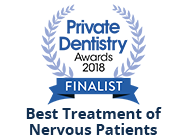
Mr Anand Mistry
BDS (Lond) MFDS RCSEd MFGDP (UK) MSc Endo
Practice Limited to Endodontics
GDC No. 103981
Anand qualified in 2006 from King’s College London and has since worked as a General Practitioner in Cornwall, North London, Hertfordshire and Buckinghamshire. In 2009, he completed a postgraduate diploma, the MFDS (Membership of the Faculty of Dental Surgery) from the Royal College of Surgeons of Edinburgh.
Anand has a Special Interest in Endodontics (Root Canal Treatment) and completed a part-time MSc in Endodontics at King’s College London in 2016, passing with Distinction. He now limits his practice to Private Endodontics.
He aims to be able to provide enhanced Root Canal Treatment which is also pain-free. He uses Microscopes to perform his treatments and also uses the latest methods such as Rotary and Reciprocating preparation and Warm Obturation techniques. This enables his patients to retain their teeth for longer. Anand regularly treats cases that are considered complex, including teeth with curved canals, re-treatments, extensively restored teeth and resorptive lesions.
He works part-time at Aspects Dental, accepting referrals from dentists within the practice, as well as from external practices. He is happy to assist the referring dentist and patient as best he can.
Anand is happily married and lives in North London. Outside of dentistry, Anand is a football fan and plays regularly in order to keep fit. He is also a keen photographer; specialising in portraits, wedding events and long-exposure photography.
- Root Canal Treatment
- Non Surgical Root Canal Retreatment
- Surgical Retreatment
- Surgical & Non Surgical Peforation repair
- Apicectomy
- Management of Open Apices
Why do i need endodontic care?
Endodontic care is also known as root canal therapy. Endodontic care is essential when the pulp (which contains the vital blood and nerve supply to a tooth) becomes infected or damaged.
Early diagnosis and treatment can help save the tooth. If you have experienced such a situation you may suffer a degree of pain as the pulp inside the tooth deteriorates.
How is root canal therapy done?
The purpose of the treatment is to remove the bacteria from the inside of the tooth and disinfect the root canals. This is achieved by isolating the tooth from the rest of the mouth and then making a small hole in the tooth to locate the pulp chamber and canals.
The canals are then measured, cleaned and shaped to allow us to fill and seal them using fine instruments called files. They are washed and disinfected thoroughly using a number of cleaning solutions. When the canals are clean, we then fill them to seal them off and prevent re-infection.
Modern advances in root canal therapy have greatly improved these stages. We now use microscopes to help us find the small root canals more easily. We have more efficient files to clean and shape the canals, and we have more advanced methods to fill the teeth to try to ensure that as many of the fine network of branches of the root canal system are filled.
When the tooth is filled, the abscess can start to heal and pain should subside.
Is success guaranteed?
Root canal treatment enjoys a very high level of success. It is, however, impossible to guarantee the success of any medical procedure. Occasionally, even with the best treatment, healing may not occur due to circumstances beyond our control
Even so, there are often further options we can discuss to secure your long term dental health and eliminate persistent symptoms or infection.
You may need endodontic treatment as a result of:
- advanced tooth decay indicating that an infection has developed.
- when a tooth is broken or fractured exposing the inside of the tooth and the pulp to bacteria that are present within the mouth.
- when a tooth has been injured in an accident which has led to the blood supply to the tooth being damaged.
- teeth with large fillings that are failing.
- acute gum disease (periodontal disease) has caused an infection.
How long does this treatment take?
This can vary according to the complexity of the treatment and which tooth we are treating. Treatment is carried out in either one appointment of between one and two and a half hours, or two appointments with an antibacterial dressing placed in the interim period.
Some treatments, for example re-treatments, or where there is existing crown and bridge work present can take a little longer. You will generally have a consultation before treatment to establish the prognosis, discuss the procedure and ask any questions. You will also have a review afterwards to ensure that the treatment has been successful.
What happens after my treatment?
Teeth that have had root canal therapy are susceptible to fracture and can break, so it is essential that you return to your regular dentist to enable the tooth to be properly protected. It is often recommended that teeth we have treated will need a crown. This is something your regular dentist will discuss this with you at your subsequent appointment.
Finally…
Endodontic care is responsible for saving and restoring teeth and smiles every year. The treatment is safe and effective and undertaken by fully trained specialists. Being referred by your dentist to Aspects Referral Care means you have the chance of protecting your teeth and smile for the future. We look forward to helping you smile again with confidence.
We are always pleased to answer any further questions about your care at any time during your treatment. Please ask one of our team who will be happy to help you.















